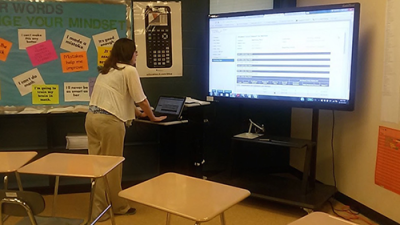Learning Science Grants to Advance Educational Technology Research

The Human-Computer Interaction Institute (HCII) at Carnegie Mellon University received two new grants to advance research in the area of intelligent tutoring. The use of intelligent tutoring systems (ITS) has been shown to bridge the gap between lower and higher performing students. ITS will continue to play a critical role in improving the performance of U.S. students in math, science and reading. Carnegie Mellon HCII faculty will be pursuing, through two separate grants, intelligent tutoring systems (ITS) that use natural language dialogue based on a student model, and a teacher dashboard leveraging advanced analytics from ITS.
Using Student Modeling to Improve the Dialogue of an Intelligent Tutoring System
Associate Research Professor Bruce McLaren has won a Department of Education IES grant, in collaboration with University of Pittsburgh researchers Sandra Katz, Pamela Jordan and Patricia Albacete. The grant is a three-year project that will develop and use a student model to improve the dialogue of an existing physics intelligent tutoring system. McLaren and his fellow researchers at the University of Pittsburgh will work to enable a natural dialogue system that tracks students as they learn physics with the ITS.
Unlike non-dialogue ITSs or systems that are not based on a student model, the system that McLaren and colleagues will enhance will tailor its instruction to a student’s knowledge and skills, identifying areas where students are strong and weak and customizing the ITS dialogue and support accordingly. “While intelligent tutoring has been shown to be effective for student learning, not many ITSs have natural language capabilities and almost none use a student model to guide dialogue with the student. That’s what we're trying to achieve in this project,” explains McLaren. By doing so, this enhanced physics ITS could offer a more personalized learning experience for physics students than was previously possible and, ultimately, improve their learning outcomes.
McLaren's interest in educational technology stems from a desire to contribute to the world around him. His mother was an English teacher who instilled in him a deep and abiding interest in education and its importance to society. He hopes that this project, as well as all of the educational technology research he does, will help inform educators and educational technologists about the best ways to provide technology-enhanced education to students. Besides his research, McLaren is a teaching faculty member in the HCII Masters in Educational Technology and Applied Learning Science program, which aspires to educate learning engineers.
Helping Teachers Help Students
McLaren will also join Associate Professor Vincent Aleven and HCII Ph.D. student Franceska Xhakaj as a researcher on another grant, this one to use advanced analytics collected from Intelligent Tutoring Systems (ITSs) to power a teacher dashboard. The grant, “Helping Teachers Help Their Students: Teachers’ Use of Intelligent Tutoring Software Analytics to Improve Student Learning,” aims to leverage the wealth of data collected through ITSs and student modeling and relay this information back to teachers and educators in an easy-to-read and actionable manner. A teacher’s dashboard for ITSs will help increase the effectiveness of intelligent tutors and help teachers and educators increase student learning. The project will use Lynette, a proven ITS for students learning linear equations in seventh and eighth graders.
Aleven’s passion for intelligent tutoring systems stems from research in this area, including his own, showing that this technology can help students at many levels and in many subject areas. He pursues this by advancing the science of how people interact and learn with instructional technology. He currently is the Director of Undergraduate Programs, Human-Computer Interaction Institute where he works with advanced learning technologies.
The Next Generation of Learning Innovators
Research from both grants will leverage educational technology to enhance learning outcomes, a topic that has been a focus for Carnegie Mellon. Initiatives like the Simon Initiative, Pittsburgh Science of Learning Center – now Learnlab – and DataShop are just a few of the university’s efforts to support robust student learning and innovate educational practices. A professional degree from the HCII is training graduates to create effective instruction and educational technologies using evidence-based research. The METALS program is a one-year program taught jointly by the HCII and Carnegie Mellon’s Department of Psychology that aims to develop the next generation of learning innovators.
See more Human-Computer Interaction Institute news.

